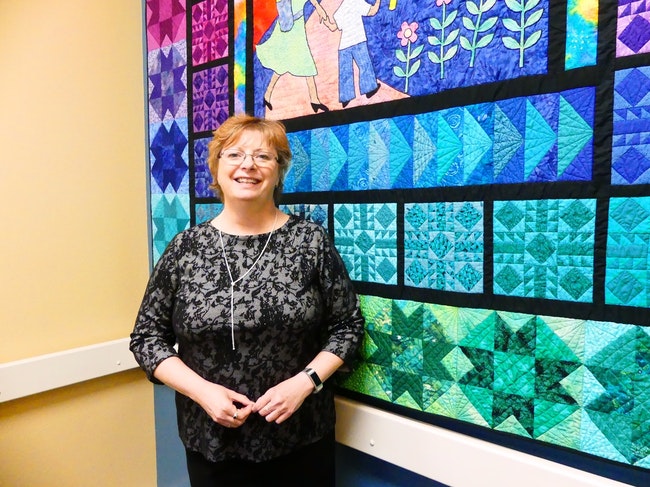
Jayne Downing, executive director of the Center for Hope and Safety, stands in the building’s office in 2019. (Rachel Alexander/Salem Reporter)
Marion and Polk counties are getting around $1.3 million in federal money to help get people who are homeless or victims of domestic violence into stable housing.
In addition to several grants renewed annually through a federal program, the funds from the federal Department of Housing and Urban Development include a bonus allocation for rapidly rehousing victims of domestic violence who subsequently left their home. The agency announced the awards on March 14.
Salem’s Center for Hope and Safety will get around $166,000, and Polk County’s SABLE House will get around $29,000. Both organizations serve domestic violence and sexual assault survivors.
Jayne Downing, executive director of the Center for Hope and Safety, said the organization will be able to serve more people at a time than it ever has with rental assistance, utilities, deposits and paying other fees so victims can get back on their feet after leaving abusive situations.
“They’re starting over from scratch very often, they’re having to rebuild their lives,” Downing said.
She said their staff also help people overcome barriers like past struggles paying rent or bad credit so they don’t “slip back into homelessness.”
The funding comes through the continuum of care program, to which the federal government distributes funding for homeless services through a competitive grant process.
Downing said it’s been difficult in the past for the nonprofit shelter to obtain federal funds, in part because they keep a confidential list of survivors separate from the centralized database other homeless service programs are typically required to use.
“For a lot of years, programs like ours really were not prioritized for funding,” she said.
The extra funds this year for rapid rehousing will help the center serve at least 10 additional families at a time. They currently have 57 people in rapid rehousing, said housing specialist Tara Stephen.
The center is also getting around $438,000 in renewed funds they successfully applied for in the past for rapid rehousing for domestic violence victims.
“We’ve seen lives transformed because of this funding,” Downing said. “There are people who tell us all the time, if it wasn’t for this funding, they would have to stay with an abusive partner or they would be living on the streets.”
Applicants have sought the federal funds through the Mid-Willamette Valley Homeless Alliance since December 2019, when the federal Department of Housing and Urban Development recognized it as the region’s continuum of care.
Marion and Polk counties were previously part of a larger continuum of care with 26 other Oregon counties, which local leaders said made it difficult to get federal funds for local projects due to the varying needs and communities.
The Mid Willamette Valley Community Action Agency will get around $189,000 to help rapidly rehouse people at risk of or already homeless, often domestic violence victims, by getting them into apartments or transitional housing.
The agency will also get around $36,000 to pay a position for “coordinated entry,” which entails interviewing homeless people in person with thorough surveys.
Responses are stored in the Homeless Management Information System, a database created by the state Housing and Community Services Department, which will also get around $15,000 in continuum of care funds for the database.
Janet Carlson, board administrator for the Mid-Willamette Valley Homeless Alliance, said the database provides more accurate information about homelessness in Marion County than the annual Point in Time Count, which provides a one-day snapshot and is known to undercount the homeless population due to the difficulty locating people.
Shangri-La Corporation is getting around $364,000 for permanent supportive housing, which provide affordable leases with social, health and job services for people who are homeless, institutionalized or at risk of either.
The Salem-based nonprofit supports people with disabilities and families with disadvantages, according to its website.
A roughly $32,000 planning grant will also support staff at the Mid-Willamette Valley Homeless Alliance involved in the continuum of care.
Contact reporter Ardeshir Tabrizian: [email protected] or 503-929-3053.
JUST THE FACTS, FOR SALEM – We report on your community with care and depth, fairness and accuracy. Get local news that matters to you. Subscribe to Salem Reporter starting at $5 a month. Click I want to subscribe!

Ardeshir Tabrizian has covered criminal justice and housing for Salem Reporter since September 2021. As an Oregon native, his award-winning watchdog journalism has traversed the state. He has done reporting for The Oregonian, Eugene Weekly and Malheur Enterprise.









